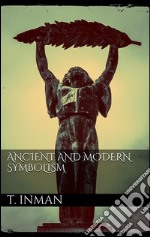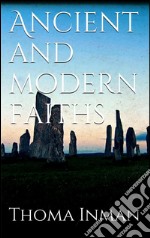Thomas Inman eBooks
eBooks di Thomas Inman di Formato Mobipocket
Ancient and modern symbolism. E-book. Formato Mobipocket Thomas Inman - Pubme, 2015 -
We search into emblems with an intention different from that with which we inquire into ordinary language. The last tells us of the relationship of nations upon Earth, the first of the probable connections of mankind with Heaven. The devout Christian believes that all who venerate the Cross may hope for a happy eternity, without ever dreaming that the sign of his faith is as ancient as Homeric Troy, and was used by the Phoenicians probably before the Jews had any existence as a people; whilst an equally pious Mahometan regards the Crescent as the passport to the realms of bliss, without a thought that the symbol was in use long before the Prophet of Allah was born, and amongst those nations which it was the Prophet's mission to convert or to destroy. Letters and words mark the ordinary current of man's thought, whilst religious symbols show the nature of his aspirations.
Ancient and modern faiths. E-book. Formato Mobipocket Thomas Inman - Pubme, 2015 -
With the idea which was gradually forced upon my mind, that there was a systematic suppression of the truth in the pulpit, I very carefully searched the Bible, with which I have been familiar from infancy, and upon which, it is asserted, all our faith is founded. At this time, too, a casual inquiry into some ancient cognomens, which have descended to us from remote antiquity, induced me to examine into ancient faiths generally. With this became associated an examination of all religions, and their influence upon mankind.I found that in every nation there have been, and still are, good men and bad, gentle and brutal, thoughtful and ignorant. That the best men of Paganism—Buddha, for example—did not lose, by comparison, with the brightest light of Christianity; and that such large cities as London and Paris, have as much vice within them as ancient Rome or modern Calcutta. I found, moreover, that there is a culpable colouring in the accounts given by Christian travellers of Pagan countries. The clerical pen rests invariably and strongly upon the bad points of every heathen cult, and contrasts them with the best elements of Christianity. I do not know that it has ever instituted a fair comparison between corresponding characters in each faith. As an illustration of my meaning, let us regard the stern virtue of the Roman Lucretia, who committed suicide, her body having been forcibly defiled by the embraces of another than her husband, even though the ravisher was a prince. She had heard nothing of the Jewish law or Christian gospel, nevertheless she was far better than the wives of the nobles in the courts of Louis the XIV. and XV., who gladly sold themselves and their daughters to the royal lechers. These, unlike the Italian woman, were instructed both in the law and the gospel; they attended one place or another of Christian worship daily or weekly. Nay, if report be true, "the eldest son of the Church," when he visited the "parc aux cerfs," made each fresh virgin, victim of his passion, duly say her prayers before she assisted him to commit adultery, and herself permitted fornication! We sympathize with Paul and the early Christian fathers in their denunciations of the Romans and Greeks for obscenities practised in honour of their gods; but, at the same time, we feel sure that, had those apostles and teachers lived in the middle ages, they would have denounced, with greater warmth, the murders which were constantly being perpetrated in honour of Jesus.

